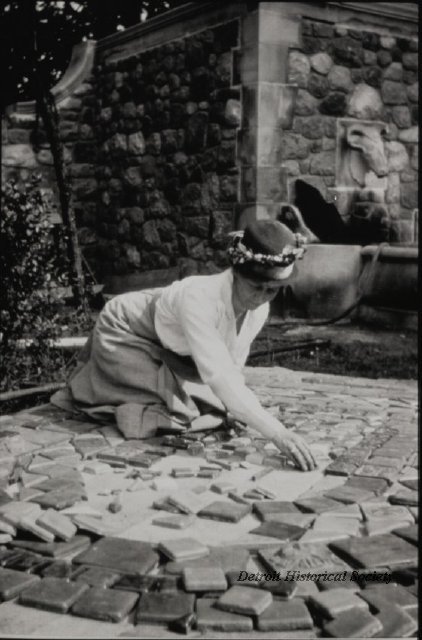On March 15, 1847, lawmakers voted to briefly make Shiawasseetown the state capital. A day later, Lansing became the state capital. A monument commemorating the novelty of Shiawasseetown having been the state capital for just a day is all that remains of the move. The land that had been platted for a capital building became a park in what is now called Shiatown.
Source: Michigan Every Day
The Detroit Advertiser of March 15, 1863, said that the number of skedaddlers climbed daily in Windsor, “though for the honor of Michigan, we are happy to say that they are by no means all from this State.” The Advertiser said that Illinois, Indiana, Wisconsin, and Iowa contributed their fair share of skedaddlers to Canada. According to the Advertiser, there were over 400 of the skedaddlers in Windsor and some of the Windsor citizens estimated the number to be as high as a thousand. There were also a large number in Amherstburg, Sandwich, Chatham, and scattered through settlements along the Canadian frontier.
After the Civil War ended, the American government offered an amnesty proclamation in May 1865, assuring draft dodgers that they wouldn’t be punished if they returned home.
Source : Kathy Warnes, “Skedaddling to Canada and Back”, Definitely Downriver, July 2012.

Mary Chase Perry Stratton (March 15, 1867 – April 15, 1961) was an American ceramic artist. She was a co-founder, along with Horace James Caulkins, of Pewabic Pottery, a form of ceramic art used to make architectural tiles.
Stratton was born in Hancock, Michigan in the Upper Peninsula, and later moved with her family to Ann Arbor following the death of her father, and from there to the Detroit area when she was in her early teens. There she attended her first art classes at the Art School of the Detroit Museum of Art. She followed that up with two years of studies at the Cincinnati Art School from 1887 to 1889 where she studied with the regionally important sculptor and educator Louis Rebisso.
Returning to Detroit she founded the Pewabic Pottery, named after an old copper mine (or sometimes, the Indian name of a nearby river) in Michigan’s Upper Peninsula, with Caulkins in 1903. In 1907 the enterprise flourished and moved from the Carriage House behind the Ransom Gillis House on John R Street to a new building designed by Detroit architect William Stratton located on Jefferson Avenue, where the business still thrives. In 1918 she married William Stratton.

Working on an outdoor garden around 1920 (Detroit Historical Society photo)
Under her leadership, Pewabic Pottery produced architectural tiles, lamps and vessels. The Pewabic Pottery became known far and wide for its iridescent glazes, and was used in churches, libraries, schools, and public buildings. New York architects McKim, Meade & White asked her to create the tiles for the roof garden of the Hotel Pennsylvania. Her work was seen in Detroit at the Cathedral Church of St. Paul, the Fisher Building, and Eliel Saarinen’s Kingswood School for Girls.
Pewabic Pottery is Michigan’s only historic pottery. It is designated a National Historic Landmark.
Stratton established the ceramics department at the University of Michigan and taught there. She taught also at Wayne State University. In 1947, she received the highest award in the American ceramic field, namely the Charles Fergus Binns Medal.
Her art was exhibited at the Detroit Art Club in 1995, and was a charter member of the Detroit Society of Women Painters and Sculptors.
Today Pewabic Pottery offers classes, workshops, lectures, internships and residency programs for potters of all ages.
In 1986 she was inducted into the Michigan Women’s Hall of Fame.
Sources :
Mary Chase Perry Stratton wikipedia entry
Jonathan Rinck, “The Life and Work of Mary Chase Perry Stratton”, Michigan History, March/April 2013, pp.22-27.
Child’s history of Pewabic Pottery and Mary Stratton–Michigan Historical Museum, part of Michigan Time Traveler.
Mary Chase Perry Stratton, Michigan Women’s Hall of Fame 1986 Inductee.
Michigan becomes 1st state to tax property to support a university
Source : HistoryOrb.com

William Alden Smith of Grand Rapids was selected as the 1st salaried fish & game warden in Michigan and served for eight years. Later on in his life, Smith went onto a career in politics, becoming a U.S. Senator. He served for 20 years in Washington, where his claim to fame was chairing the hearings into the sinking of the Titanic.
Source : HistoryOrb.com
For more information, see DNR Law Enforcement Division Celebrates 125 Years
On March 15, 1963, the all-white Mississippi State basketball team snuck out of its home state, defying a court injunction prohibiting the team from competing against black players. The team traveled to East Lansing, Michigan to play Loyola (Chicago) helping in part to end segregation in college sports. Loyola won the game 61-51, and went on to win the national championship.
Source : Detroit Free Press, August 3, 2012.
For another article, see Jerry Green, “Before the Madness, an NCAA Tournament game that truly mattered”, Detroit News, March 15, 2013.
That’s the feeling I got the other night when I joined several dozen other foodies to hear Ari Weinzweig, one of the world’s great nosh kings, share origin stories — and generous samples — of the corned beef, chopped liver and other favorite deli foods that helped make Zingerman’s an Ann Arbor institution.
As participants savored the toothsome treats, Weinzweig told of his passion for unearthing the best, full-flavored ingredients and products across the globe, from local Jewish kitchens and bakeries to the cheese markets of Comte, France, high up in the Jura Mountains.
Dubbed “The Best of 35 Years with Ari,” the $60-per-person tasting will be repeated March 22. And it was just one in a year-long series of events celebrating the 35th anniversary of the modest corner deli in Kerrytown that Weinzweig co-founded with Paul Saginaw on March 15, 1982.
Through March 31, anniversary discounts will be offered on over three dozen favorite Zingerman’s Deli items, including several featured at the evening tasting: Jewish rye, City Goat cheese and Original Zzang! candy bars. And anyone who pre-orders and pays for a birthday cake on Wednesday, Zingerman’s actual birthday, will get 35 percent off (call (734) 663-5282). Original art posters also are discounted throughout the month.
To find out more, check http://zing35.com
Source : Susan Pollock, “Zingerman’s Deli celebrates 35th anniversary in Ann Arbor with tastings and discounts“, Detroit News, March 14, 2017.
Whether you like it or not, Proposal A was a landmark event in Michigan school finance.
After 25 years of futility and 12 ballot proposals, in 1994 Michigan voters approved Proposal A, which revamped the way the state funds K–12 education. Voters reduced the state’s relatively high property taxes, which had been about 35 percent above the national average before the reforms and now are about the same as the national average. Proposal A not only gave property tax relief but reduced funding disparities among school districts—spending had ranged from $3,400 to $10,300 per pupil.
Local property taxes for schools were largely replaced with new state education taxes. The reforms
- increased the state’s 4 percent sales tax to 6 percent and earmarked the increase for the School Aid Fund;
- created several new revenue sources for schools, including a 6-mill state education property tax and a 75-cent per pack cigarette tax;
limited annual property tax increases on each parcel of property to the lower of (1) the inflation rate or (2) 5 percent; - stipulated that school districts on the low end of the funding spectrum would receive bigger annual funding increases than would the “richer” schools; and
- eliminated a number of categorical (special) grants and rolled the funds into the foundation allowance.
For more information, see Michigan K-12 Funding from Michigan-in-Brief, April 1, 2002.
“Proposal A – Background Information”.
School Finance Reform in Michigan – Propoal A : Retrospective, Michigan Department of Treasury, Office of Revenue and Tax Analysis, December 2002.
Most Michiganders know that Biggby Coffee originated in Michigan, but there still a good number of us who didn’t realize. So here we go…..
Biggby coffee shops have gotten so popular throughout the country over the years, that we tend to forget that the company was created right here in Michigan. To be more specific, in East Lansing.
Bob Fish and Mary Roszel met while students at Michigan State University – they were also employed at the local Flap Jack Shack on Grand River Avenue. I assume they were both coffee hounds – otherwise, what better reason could there be to open a coffee house?
They decided upon the name “Beaner’s”, and in 1995 opened their first shop in a former Arby’s location on Grand River Avenue. Word spread about this new coffee house throughout the MSU campus and soon the place was filled with students. The student popularity factor spilled over into the mainstream consciousness, and soon non-students, office workers, commuters, mom & the kids, and many others got the “Beaner fever”.
By 1999, they had opened up a couple more shops in Lansing/East Lansing and expanded even further once the new millennium hit.
For a good ten years since they opened, the owners, managers, and baristas were bombarded by customers who attempted to quietly mention that the name ‘beaner’ was not a good term to use, as it may be deemed an offensive slur. Admitting innocence and not realizing his term based on coffee beans might be disrespectful, Bob delved into some research to change the name. It was decided the best new name would be based on the big “B” in the Beaner’s logo. So beginning around 2007-2008, Beaner’s was now officially known as ‘Biggby’.
Due to the perseverance of Bob, Mary and co-owner Mike McFall, Biggby has coffee shops in Florida, Illinois, Indiana, Kentucky, Michigan, New Jersey, North Carolina, Ohio, South Carolina, Virginia, and Wisconsin…with more coming, I’m sure.
It’s another Michigan creation that became a national hit…..
Source : John Robinson, “Born in Michigan: Biggby Coffee, 1995“, 99.1 WFMK Blog, September 16, 2021.

On March 15, 2004, Bob Seger was inducted into the Rock and Roll Hall of Fame. Born in Ann Arbor, Seger was a recording artist and a favorite in Detroit for more than 10 years before finally breaking through nationally with 1977’s “Night Moves” album.
Over his more than 40-year career, he has sold over 50 million albums, none better than Night Moves, but some prefer Like A Rock or Old Time Rock and Roll. And then there’s We’ve Got Tonight
Source : Detroit Historical Society Facebook Page
For more information, see The story of Michigan rocker Bob Seger, Detroit News compilation.
For more information, see Bob Seger Wikipedia Entry and Rock and Roll Hall of Fame Inductee Bob Segar